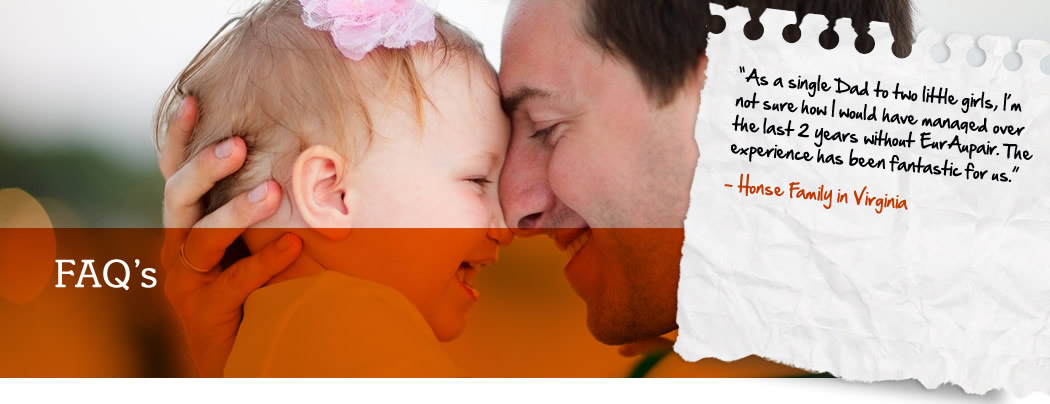- Become an Au Pair
- Why EurAupair is the Best
- Living in America
- Our Partners in Your Country
- Testimonials
- How to Apply
- Protect Yourself from Scams
- Resources
- Au Pair Insurance
- Education Requirements
- FAQ's

Frequently Asked Questions for Au Pairs
The Application Process
Q: How do I apply?
A: You will need to complete the application process in your home country so please refer to the list of EurAupair’s partner organizations abroad and get in touch with your home country office.
Q: Do I need a driver’s license to apply as an au pair?
A: Yes, most families do need their au pair to be able to drive the child(ren) from and to school or to their extra-curricular activities. Check with the EurAupair partner organization in your home country to see whether you may start the application process before passing your driver’s license.
Q: Do I need a secondary school diploma to be an au pair?
A: Yes, au pairs must have a secondary school diploma (or equivalent) or higher and submit evidence during the application process.
Q: What English level is required?
A: You will need to be proficient in English, mostly speaking and listening. You will need to be able to communicate with your family upon your arrival, and also help the child(ren) with homework, etc. Your home country office will evaluate your English level during the interview.
Q: What kind of child care experience is needed to become an au pair?
A: You will need to demonstrate long-term or regular child care related positions (baby-sitting, day care, kindergarten, camps, etc.) with children from 0 to 14 years old. You will need to submit at least three references of which should be two child care related. You will only be able to care for children from 3 months to 2 years old if you are Infant Care Qualified – meaning if you have (and are able to demonstrate) a minimum of 200 hours of experience with children under the age of 2. Infant Care Qualified au pairs are usually placed more easily as your profile is a potential match to every family.
Q: What is the application process like? Is there an application fee?
A: Your home country office will be able to give you a detailed process as well as the application fee. As part of the screening, EurAupair au pairs are required to complete a personal interview, a criminal background check, a medical examination, submit three references, proof of high school graduation, and pass a psychometric test.
Q: Can I choose my area or city?
A: No, au pairs must be flexible on location. Keep in mind that host families generally are close to bigger cities as you will need to attend classes at a college or university during your program year.
Q: Can I choose my family?
A: You will be indirectly choosing your family by representing yourself through your application. However, it is the family – parents and child(ren) – who choose their au pair based on their perception of her personality and through her application and interview.
Preparing for the Year Ahead
Q: What is included in the EurAupair New York Workshop?
A: Upon arrival in the USA, EurAupair au pairs spend time in New York City before heading off to their homestay communities. Much of this time will be spent participating in the EurAupair "Au Pair Workshop," taught by experienced instructors. Although you will be actively involved in interesting and helpful learning activities during your EurAupair "Au Pair Workshop" you will have an opportunity to see many of New York's famous sights such as the Statue of Liberty, the Empire State Building, Broadway, Times Square, Fifth Avenue, Central Park and more.
Q: Are there any costs I am responsible for during the New York Workshop?
A: During these five days, all expenses are paid for by EurAupair: airport transfers back and forth, accommodation, meals, classes/instructions and the New York City Bus Tour. You should however plan to bring some pocket money should you want to buy any souvenirs, or go eat out on your own during your stay.
My Year as an Au Pair
Q: What will be my stipend?
A: Your weekly stipend will be a minimum of $195.75 if you are an au pair in the regular program and $250 if you are a par experience au pair. Your stipend will be paid weekly, regardless of the number of hours you work (up to 45 hours per week).
Q: Do I have vacation during the year?
A: Yes, you will have two weeks of paid vacation during your program year. You will have one complete free weekend per month, and a minimum of 1 ½ consecutive days per week free for the remainder of the month.
Q: Can I travel during the year?
A: You will have two weeks of paid vacation during your program year, which can be an opportunity for you to discover new parts of the country! In addition you will have your days off to take trips (although we encourage you to participate in the family life). Also, at the end of your program year you will have the possibility to stay in the U.S. for up to an extra month, during which you may not work but are welcome to travel and explore the country before heading home! Read more about traveling outside of the United States.
Q: Can I attend classes during the year?
A: Yes! In fact the U.S. government regulations require that au pairs be provided with opportunities for cultural and educational enrichment. As part of your program you will need to complete 6 credits (or its equivalent) at a post-secondary accredited institution. Your host family will contribute up to $500 towards your tuition fees. You will select your school and your class as long as the curriculum includes substantive academic coursework relating to the study of American culture, values, history, geology, politics or the arts. Visit our Au Pair Education Requirements page for more information!
Q: What are my duties as an au pair?
A: In addition to child care, au pairs are expected to perform light housework related to the children. This can include tidying up and vacuuming the children’s rooms, preparing their meals, or helping with their laundry. Au pairs are of course also responsible for cleaning their rooms and doing their laundry.
Q: Does EurAupair provide any support during the year?
A: Yes, of course! Each family and au pair has a Community Counselor close to their home, available throughout the year for advice and support. The Community Counselor will organize, once a month, a meeting with you and any other au pairs in his/her area. Twice a year your Community Counselor will plan cultural meetings, which is another chance for you to experience something specific to the United States or to your local area. You may reach out to your Community Counselor at any time with questions or to discuss any concern or issue.
Q: What should I do if I run into issues during the year?
A: Your Community Counselor but also your Area Coordinator are here to assist you in your adjustment to the United States and support you during the year should any issue or challenge arise. It is not uncommon to experience adjustment issues, usually soon after arriving but also at different stages of the program. Do not hesitate to reach out to a EurAupair Representative for some advice.
Administrative Matters
Q: Who takes care of my visa?
A: After being placed with a host family, your home country organization will send you the documents needed to obtain your J-1 visa, as well as inform of the steps to take in order to apply and receive your visa.
Q: What does my insurance cover?
A: A: Please refer to our Au Pair Insurance page for details about your insurance coverage and links to find a doctor close to you. We recommend you to always give a call to the insurance provider before visiting a doctor or urgent care facility to insure coverage.
Q: Do I need to pay taxes on what I earn during my program?
A: The U.S. Internal Revenue Service considers au pairs to be employees of the host family for tax reasons, even though they are in the United States on a “cultural exchange” visa. This means that au pairs are required to file U.S. individual income tax returns even though many au pairs will not owe any taxes. Please refer to our Tax Information page on the Au Pair Resources tab for more information.
Q: Do I need an international driver’s license?
A: It is best to get an international driver’s license as the driver’s license from your home country will not be enough for you to drive permanently while in the United States, and we encourage you to also apply for a state driver’s license once in the United States.




